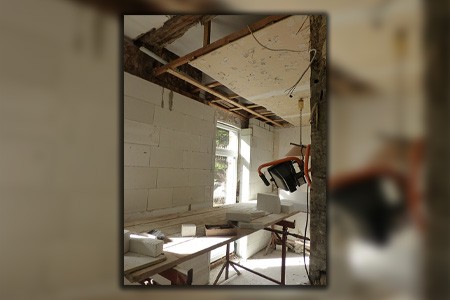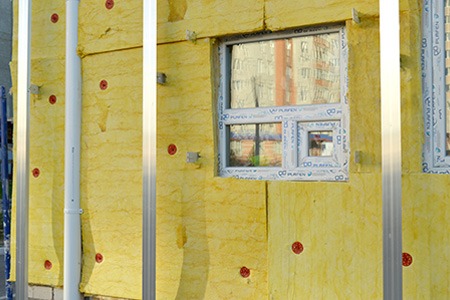The Pros & Cons Of Insulating Your Garage
Author: Omar Alonso | Editor: Omar Alonso
Review & Research: Jen Worst & Chris Miller

People tend to blow hot and cold when it comes to insulating their garage. Whether or not it's worth it depends on how you use your garage. Considering the pros and cons of insulating a garage can help you make a judgement on that.
By insulating a garage, you can enjoy it so much more. Your vehicles will get an organized space, and it will become a more soundproof soothing place while increasing your property value. That's not all; you'll also have a cleanly environment that'll enrich your overall living standards.
However, it also has drawbacks, such as extra construction expenses and the requirement for making the space unusable while you work on it. So, let's dig down with some elaboration of the whole fiasco.
Are Garages Insulated?

In a typical scenario, are garages insulated? An insulated garage means that the temperature inside your garage is entirely comfortable and within your control. Moreover, it doesn't require any other devices like a heater or a cooler.
To understand whether a garage is insulated or not, we have to check them out first. Garage insulation mostly depends on the garage walls as the temperature gets imbalanced primarily by seeping in and out through the walls. So, try checking the walls first.
Most of the garages are not insulated. Often the walls of a garage come out protected from the market, but they are costly. So, the chances of your garage being insulated are pretty low.
What are the Pros & Cons of Insulating a Garage?
"Should I insulate my garage?" We have realized that to land on a specific choice; you need a crystal-clear view of the aftermath of insulating a garage.
Therefore, here in this section, we'll let you know all the ins and outs of the advantages and the possible disadvantages that you're likely to face while insulating your garage.
Benefits of Insulating a Garage

Let's go through what this process has to offer us. What you gain is far better than what you lose. Here are the benefits of insulating a garage.
Saves on Energy Bills
The biggest reason why we consider this process is it significantly helps to bring down energy bills. If you spend a lot of time in your garage, you will need to turn on the heater during winter and the air conditioner during summer.
This can surely leave you with nothing but considerable numbers on your electricity bills. Therefore, having garage insulation will help you maintain the temperature without any heater or air-con, if we're talking about attached types of garages and not separate ones built as their own structures.
Reducing Sound Travel
You get an mostly soundproof place when you insulate your garage. The insulated walls prevent sound and temperature from going outside, making it more like a soundproof room.
So, you can now turn this garage into an ideal space for business work, mindful study, and even meetings (both personal and professional).
Health Benefits Tag Along
Insulation prevents carbon monoxide from leaving the garage and entering your home. Want to know how? Hint: it's not just through your choice of garage ventilation that it escapes, but it's also about where it doesn't escape.
When your garage walls are properly insulated, these toxic gases (mostly produced by your vehicles) can't pass through the walls and invade your home. So, if you want to breathe healthy, insulating your garage walls is a must-do for you!
Property Value
An insulated garage drastically increases the home value, especially when you're planning to put it for sale. If the garage is completely finished it can be counted in the square footage calculations of livable space.
This can be an attractive feature for potential buyers to get in hold over your home at an astounding rate. The reason is people tend to get allured when they see residences having high-tech features such as an insulated garage.
So, sooner or later, getting garage walls insulated can prove to be the ace of spades for you if you want to get a big bid on your property.
Negatives of Insulating a Garage

Now, let's check on some possible drawbacks that you're likely to encounter with an insulated garage.
The Insulating Process Can Be Expensive
Although insulation saves up energy bills, the installation cost is pretty high. The equipment and service require around $1.07-$2.44 per square foot on average. However, the costs may vary depending on the location and material you choose.
If you take professional help instead of getting it done by yourself, it will also cost you more. That's not all; the bigger the garage, the higher the installation cost.
You will slowly recoup the costs from your energy usage savings, but it will take decades if we're being honest. And if you sell you can't really consider this an improvement and increase the price, as it should have already been done in the minds of most buyers.
The Garage Door Issues
The giant air leak every time you open any types of garage doors attached to an insulated garage seems problematic. It's the most obvious issue when it comes to the pros and cons of insulating a garage. And you also know the "never opening the garage door" isn't an option too. It's just something you have to deal with.
Something that may at least help offset the issue would be to have an insulated garage door as well. And this complete installation will upset your pockets, but if you spend a lot of time in the garage it's totally worth it in the colder months.
Potential Risk of Summer Days
There are chances of insulating garage walls to trap temperature. Well, this might not be a biggie during the winters, but the summer days can be a challenge.
Since the overall environmental temperature can have an exponential rise, you might not want to have insulation. A solution is if you have garage windows you can leave them open when it's not raining, though this then introduces a security issue as you won't be monitoring the garage all day.
Insulation Process Takes a Lot of Effort
You need to replace a lot of things for proper insulation. For instance, you must replace your garage doors if they are unsuitable for insulation. And we don't mean garage door alternatives but an insulated garage door, specifically.
Moreover, the larger the space, the more complications you're likely to encounter. Things can get even worse if you have an attic and decide to insulate it, as attics require a lot of replacements for protection.
That's not all; you'll also need to extend your pockets, especially when you have a large space to get insulated.
Quite a Sensitive Decision
One of the scariest parts of insulating a garage is barren installation can make the whole expensive process look worthless. Without proper finishing, the garage will look very ugly and won't be of much use.
Therefore, if you want your insulated garage to have a top-notch and attractive finish, always take the assistance of recognized professionals and companies to help you complete your unfinished garage.
Does Insulating a Garage Help to Prevent Insects?

By insulating a garage, you can stay assured that there won't be any drafts or holes. Moreover, the seal-up even resists air escaping from your space.
Therefore, while insulating the garage, you are even blocking the free entrance of bugs and insects. There will still be some here and there but in general you'll reduce their numbers greatly. This is one of the biggest considerations when it comes to the pros and cons of insulating a garage.
And do you know what's even more interesting? You simply won't need to flush your money for different pesticides and chemicals to get rid of bugs since, with garage insulation, you won't have bugs on your property.
A big annoyance is if you have a smoke detector and fire alarm in your garage, which you should. Bugs will see the blinking light on it at night and when enough of them crawl in there it can randomly set the alarm off.
And if the alarms are all wired together, it'll set them off across the whole house and give you a scare. And to top it off, you'll have to stop what you're doing (probably sleeping), get your ladder, and climb up to pull the alarm off and clean it out, or it'll will keep going off until you at least unplug it.
Can an Uninsulated Garage Bring Fire Hazards?
If you go through any set of fire administration articles, you will find hundreds of garage fire occurrences. Most of them are caused by low-quality wiring, oily rags, and even a lack of safety.
However, by adding fire resistant garage insulation, you can reduce many such potential risks, or at least stop any fire from spreading before you can attend to it. This is one of the reasons why many people call the insulation garage the 'fireproofing' process.
Does Insulating a Garage Make a Difference?

Does insulating a garage make a difference?Yes, insulating a garage helps you in many ways. It saves the garage from weather issues and is also a healthy choice for you. Let's have a look at how.
It Helps You to Tackle Bad Weather
Typically the garages are not insulated. So, it is tough to keep up with the challenging weather outside. That's precisely why insulating the garage is the best choice ever!
An insulated garage has its temperature comfortable for you, even if the weather outside is harsh. So, you don't have to use a heater or any such device to maintain the temperature in your garage.
Keeps the Temperature Convenient
An insulated garage's advantages reflect in it transparently. If you compare an insulated garage with an uninsulated one, you'd see how an insulated garage keeps your family and cars safe.
The difference of temperature between your house and garage is evident. You can’t step into the garage right after being in your air-conditioned house. The instant change of surrounding temperature can cause you severe diseases.
An insulated garage beats up the risk of these diseases as it keeps the temperature the same for you in and out. It even helps with appliances in the Summer like a freezer in the garage not having to work as hard.
Is it Worth it to Insulate a Garage?

Is it worth it to insulate a garage? Well, to be honest with you, it's definitely worth every single penny to insulate your garage at home. One of the primary reasons for this is that it keeps your car in such a well-managed territory, ensuring no damage occurs.
You do need to consider that an insulated garage will trap the carbon monoxide produced by your cars inside with the insulated walls. You'll need to air it out occasionally if you leave your car running while inside the garage. But still, there are many other benefits that you can have by insulating your garage to offset the few new considerations.
Although, there can be some setbacks, such as the overall installation process and all. But at the end of the day, it can be worth investing in. So you should consider this beneficial idea of owning an impressive garage.
Besides all of that, the main points are that you're likely not heating or cooling your garage. Even those with insulated garage doors usually don't. A space heater tends to take care of the winter time's need for heat. But you can heat up the whole garage if it's insulated. This is important when it comes to the pros and cons of insulating a garage, especially for those that work on projects year round.
If you have living space over the top of the garage, it does help to at least insulate the ceiling. Otherwise, unless you're spending a lot of time in the garage, the answer may be no. If you do a lot of work in the garage in the winters mainly, then yes, it can be very worth it simply for your comfort.
How Do I Know if My Garage is Already Insulated?
The easiest way to check is to remove some light switch covers or power outlet covers. You can use a flashlight to look between the sides and into the recess of the wall and see if there's any existing insulation already present. Be aware, you may see fluffy batting or rigid fiberglass insulation boards. They don't look the same.
8 Signs It's Time to Upgrade Your Garage Insulation

Insulation doesn't stay in perfect shape forever. You could benefit from pulling out the old insulation and adding new in. Here's ways to know if this would be worth your effort:
- The bonus room or bedroom above the garage is always uncomfortable no matter the season.
- You don't have drywall in the garage and can see that the existing insulation is falling apart, flaking, crumbling, and/or sagging.
- Any noise being made in the garage can be heard all throughout the house.
- You can feel heat or cold radiating from the door between the inside of the house and the garage.
- Rooms that share walls with the garage are too hot or too cold, depending on the season.
- Any floors near the garage inside the house are extra cold during the winter and the garage floor itself sweats in the summer.
- It's been 10 years since your last insulation or even investigation into the garage's insulation.
- Near the power outlets and light switches inside the house on shared walls with the garage, you can feel hot or cold air drafts blowing through.
The above signs are all indicative that it's at least worth considering upgrading your existing insulation or adding new insulation to the garage walls and ceiling.
Garage Insulation Options
Your choices for the types of insulation to have installed include:
- Fiberglass batting
- Spray foam insulation
- Rigid fiberglass boards
- Cellulose insulation
Each of these have their own pros and cons. Fiberglass batting is the fluffy pink insulation (it's not always pink) that works fairly well but can have problems with moisture. Spray foam really only works well in the ceiling as it won't adhere to walls. If you do work with it, use these tips to get spray foam off your hands, you'll need it (or just wear gloves).
Rigid insulation boards work great but they're time consuming to install and there will be some gaps between studs, usually. Studs are 16 inches apart on center as a standard, meaning there's a 14.5" gap between them. Rigid fiberglass will be created to fit between them but there can be bowing of the boards and other issues that create small gaps. Cellulose works great and is eco-friendly but will cost you more.
You're probably wondering about the most popular and available choices. The differences between insulation batts and rolls are largely only in appearance and how easy they are to work with, depending on where they're being installed.
What R-Value Insulation is Best for Garages?
The R-value of insulation is a measurement of how well it resists the flow of heat through it. The higher the R-value, the better the insulation is. You'll want to stick with R-values between R-30 and R-40 (the standard for interior walls is between R-13 and R-21). The reason for the higher values is that these are exterior walls that tend to be deeper, and you'll need to create a very good thermal barrier there.
The Pros & Cons of Insulating a Garage Say 'Do it'!
So should you insulate your garage? We all can relate to the fact that we always use the extra garage space by putting something else in there. We even use it as an extra room to play or to do official work.
Now an insulated garage can help you more with that. The insulated walls are more like a soundproofing system inside the garage. Thus, you'll be able to have a good time in the garage and conduct your work and meetings without much of a hassle.
However, now that we're at the end of our chatter today, we hope you now have a crystal clear understanding of the pros and cons of insulating a garage.



